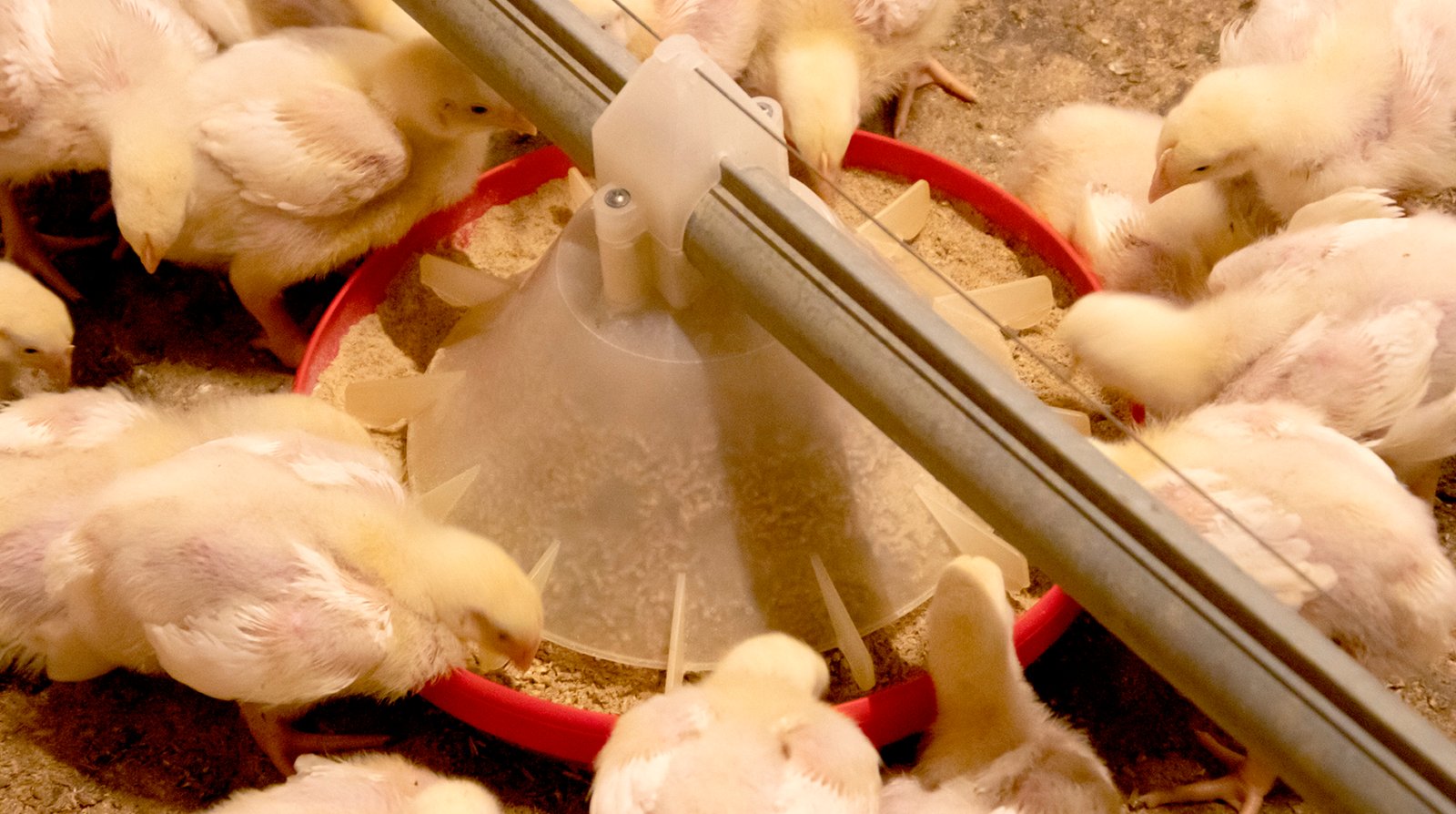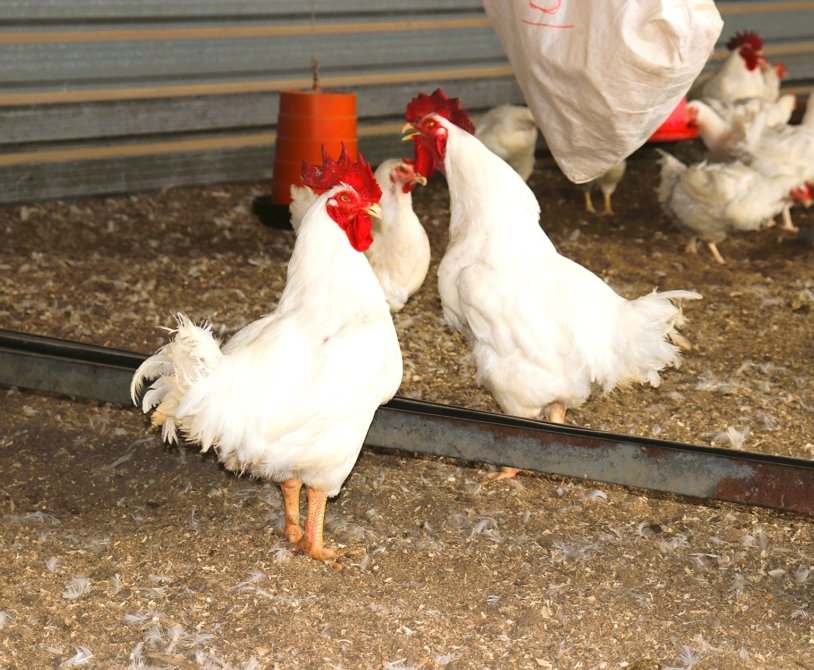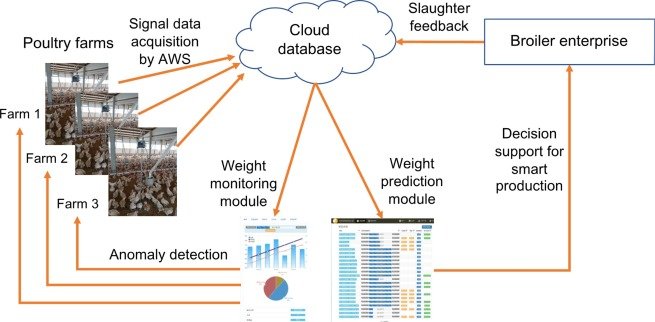Today’s commercial broiler is the fastest-growing, leanest, and most feed-efficient bird ever. Over the past few decades, intensive genetic selection has led to these birds needing better care and nutrition. This includes improved weight gain, better feed use, and more lean muscle.
Nutrition is essential to unlock the full potential of these birds. The right nutrients in the right amounts are needed for their rapid growth. This ensures they grow efficiently and healthily.
Key Takeaways
- Genetic advancements in broiler chickens require optimized nutrition to achieve maximum performance and profitability.
- Precise poultry feed formulation is critical to support rapid growth, feed efficiency, meat quality, and bird health and immunity.
- Precision poultry nutrition strategies can help producers maximize broiler performance and reduce environmental impact.
- Innovative feed technologies and digital tools can aid in developing sustainable poultry production practices.
- Broiler health and intestinal integrity are crucial factors influencing overall broiler meat quality and production efficiency.
The Growth of the Global Poultry Industry
The global poultry industry has grown a lot in recent years. This growth is due to more people wanting to eat poultry meat all over the world. The OECD-FAO says that meat consumption has gone up, with poultry meat growing the fastest.
This increase in demand is because of higher incomes, more people moving to cities, and growing populations. Especially in countries that are still developing.
Increasing Demand for Poultry Meat
Poultry meat is becoming more popular because it’s affordable and versatile. It’s also seen as a healthier choice compared to other proteins. This makes it a favorite among people looking for better food options.
As a result, the demand for poultry products keeps going up. This is especially true in places like India, China, and other parts of Asia.
Advancements in Broiler Chicken Production
The broiler chicken industry has made big strides to meet the world’s growing need for poultry. Improvements in genetics, feed, and housing have boosted broiler growth and efficiency. These changes help the industry keep up with demand, providing affordable meat for everyone.
The mix of more demand and new technologies has set the stage for the poultry industry’s future growth. As it continues to evolve, focusing on sustainable and precise nutrition will be key. This will help improve broiler performance, meat quality, and the industry’s success.
The Impact of Nutrition on Broiler Chicken Performance Indicators
Nutrition is key to broiler chickens’ growth and performance. The right mix of energy, protein, and vitamins is crucial. Without it, their growth and health can suffer.
Poultry experts must keep updating the diet to match the birds’ genetic improvements. Heat stress and how the birds are kept also affect their nutrition. This shows why precise nutrition is so important.
| Performance Indicator | Nutritional Factors | Impact |
|---|---|---|
| Growth Performance | Energy, Protein, Amino Acids | Adequate energy and a balanced amino acid profile are critical for optimal growth and feed efficiency. |
| Meat Quality | Protein, Vitamins, Minerals | Proper protein nutrition and antioxidant vitamins and minerals can improve breast meat yield and color stability. |
| Gut Health and Immunity | Probiotics, Prebiotics, Amino Acids | Supplementation with beneficial gut microbes and specific amino acids can enhance intestinal integrity and immune function. |
By making the right broiler diets and using precise feeding, producers can boost performance. This leads to better feed use and higher-quality meat. It also makes broiler farming more sustainable.
“Poultry nutrition is the foundation of successful broiler production. Balancing the diet to meet the birds’ evolving nutritional requirements is key to unlocking their full genetic potential.”
Energy Requirements for Optimal Growth
In the world of broiler chicken production, energy is key. These birds have become better at turning feed into muscle. Carbohydrates, fats, and oils are the main energy sources, helping them grow and stay healthy.
The Role of Carbohydrates, Fats, and Oils
Cereal grains like corn, wheat, sorghum, barley, rye, oats, triticale, and millet make up 60–70% of a chicken’s diet. Corn is especially good because it’s high in energy and easy to digest. Other foods like soybean meal, sunflower meal, and potatoes also add energy to their meals.
As broiler chickens get better, it’s important to get their diet just right. Nutritionists need to balance energy sources to help them grow fast without getting too fat. This affects broiler growth performance, feed efficiency, and meat quality.
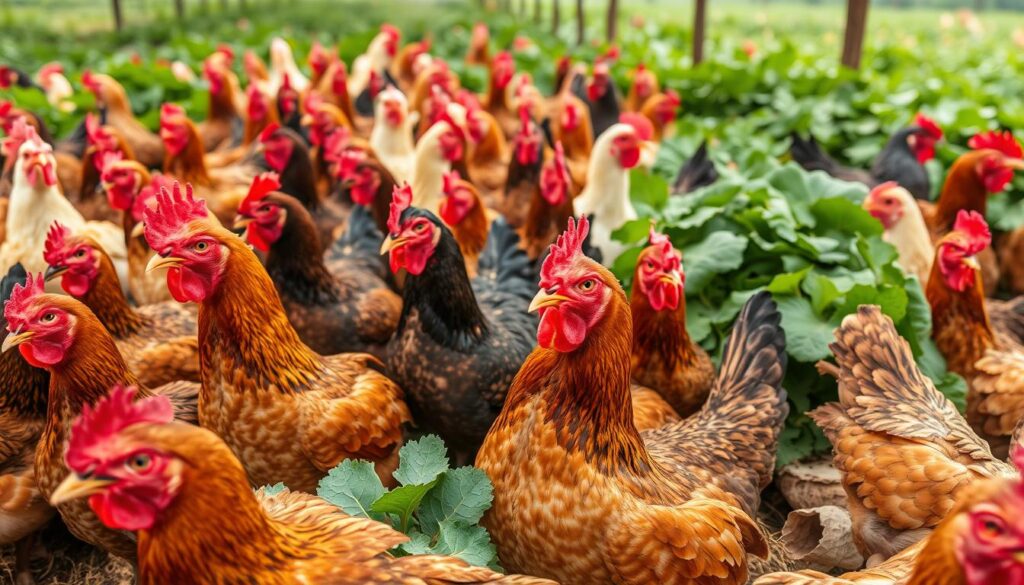
“Different energy levels in diets for broiler chickens did not significantly affect weight gain; however, feed conversion efficiency improved with diets containing 3040 and 3120 kcal/kg of AME.”
Finding the right mix of energy, carbs, fats, and oils is a challenge. It needs careful planning in poultry feed formulation to keep broiler health, immunity, and sustainable production in check.
Protein and Amino Acid Balance
In the world of broiler chicken nutrition, protein is key. It affects growth, feed efficiency, and meat quality. Grains, oilseed meals, and animal by-product meals are the main sources of protein.
Broilers now convert feed into muscle more efficiently. This means they need more protein and amino acids than before. Getting the right amino acid balance is vital for their growth and meat quality.
Soybean meal (SBM) is a top choice for protein in poultry feed, with about 40–48% crude protein. But plant proteins often need extra amino acids or animal proteins to meet the balance.
Animal proteins are pricier but offer more protein and amino acids. They also have more phosphorus and minerals. Adding animal proteins can boost performance over regular diets.
Synthetic amino acids like lysine and methionine are used to replace animal proteins. They help improve feed efficiency and lower costs. They also reduce nitrogen waste, which is good for the environment.
Getting the amino acids right in broiler diets is crucial. It affects the Impact of Nutrition on Broiler Chicken Performance Indicators. This includes growth, broiler feed efficiency, broiler meat quality, and broiler health and immunity. It’s a key part of precision poultry nutrition and sustainable poultry production.
Macro Minerals: Calcium, Phosphorus, and Electrolytes
The Impact of Nutrition on Broiler Chicken Performance Indicators is greatly affected by the right balance of macro minerals. Calcium and phosphorus are key for bone health and nerve function. Sodium, potassium, and chloride are important for metabolism.
Broiler diets often have too much calcium and phosphorus. But we can lower these levels for older birds without hurting their performance. Using ‘organic’ minerals can make feeds cheaper and better for the environment.
Nutritionists are looking closely at mineral levels in broiler diets. They want to give the right amount without too much. This is crucial for broiler health and immunity and broiler meat quality.
“Broiler nutritionists will need to redefine mineral levels in diets to decrease costs, improve performance, enhance sustainability, and reduce antagonistic interactions with other nutrients.”
Birds can control how many minerals they take in and get rid of. Most mineral absorption happens in the small intestine. Organic trace minerals are usually more available than inorganic ones.
Creating the perfect poultry feed is key to broiler growth performance and broiler feed efficiency. It also helps with sustainable poultry production and precision poultry nutrition.
Vitamins and Trace Minerals for Metabolism
Vitamins and trace minerals are key for broiler chicken growth and performance. They are needed in small amounts for many functions. These include energy production and immune system regulation.
Antioxidants and Immune Function
Antioxidants, like vitamin E, are vital in broiler nutrition. They protect cells from damage caused by oxidative stress. This damage can slow growth, reduce feed efficiency, and lower meat quality.
Having enough vitamin E and other antioxidants in their diet keeps the birds’ immune system strong. This helps them fight off diseases and infections better.
Research shows that broilers fed diets with more chelated trace minerals, like zinc, manganese, and copper, had better antioxidant levels. This means these minerals are important for the birds’ natural defenses and metabolic health.
So, it’s crucial to balance vitamins and trace minerals in the broiler diet. This ensures the best growth, feed efficiency, and meat quality. It also supports the birds’ health and well-being.
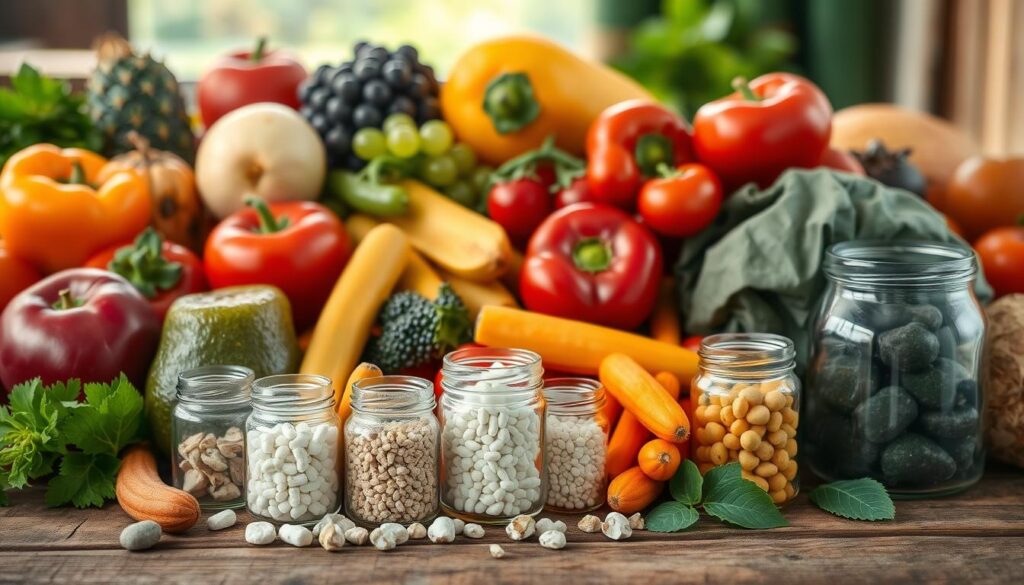
“Broilers fed the CTM100 diet showed the lowest overall feed conversion ratio (FCR) and serum malondialdehyde level, indicating improved feed efficiency and reduced oxidative stress.”
Feed Efficiency and Nutrient Density
In broiler chicken production, feed efficiency and nutrient density are key. They affect growth, feed use, and meat quality. Producers must choose the right diet to boost profits.
Today’s fast-growing broiler strains need more nutrients in their diet. This is because their protein and amino acid needs grow faster than their energy needs. If the diet lacks nutrients, it can harm growth, feed use, and meat quality.
| Performance Indicator | Impact of Nutrient Density |
|---|---|
| Body weight gain | Increased with higher nutrient density |
| Feed efficiency | Improved with higher nutrient density |
| Carcass composition | Positively influenced by higher nutrient density |
Precision poultry nutrition and sustainable practices are vital. They help meet the world’s demand for broiler meat. By making diets more nutrient-dense, producers can improve growth, feed use, meat quality, and health.
“Maximizing feed efficiency and nutrient density is the key to sustainable poultry production and meeting the world’s growing appetite for high-quality broiler meat.”
Gut Health and Intestinal Integrity
Gut health and intestinal integrity are key for broiler chickens to absorb nutrients well. Heat stress, pathogens, and bad diets can harm the gut. This makes it harder for chickens to get the nutrients they need and makes them more likely to get sick.
Probiotics and prebiotics in their diet help keep the gut healthy. Probiotics are good bacteria that keep the gut balanced. Prebiotics are fibers that feed these good bacteria.
Studies show these nutrients help broilers grow better, eat less feed, and have better meat and health. For example, adding yeast cell wall (YCW) to their diet made their intestines healthier. It also made their gut bacteria better.
Broilers on YCW had better gut health. They had more mucus to protect their intestines. They also had more good bacteria and fewer bad bacteria in their gut.
This shows how important good nutrition is for broiler chickens. It helps them grow well and stay healthy. By focusing on gut health, we can make poultry farming better and more sustainable.
Meat Quality and Carcass Composition
Nutrition is key to making broiler meat better. The right mix of amino acids, antioxidants, and lipids can make meat tender, juicy, and flavorful. It also affects the type of fatty acids in the meat. Nutritionists must pay close attention to these details to produce high-quality meat.
In the USA, people are choosing healthier meat options more often. Omega-3-enriched broiler meat is becoming popular. Studies have looked into how fatty acids are distributed in this meat. They also analyzed meat consumption trends globally from 2000 to 2019.
Genetics and breeding are also important in broiler production. Research has shown how these factors have improved over the years. It has also looked into breast myopathies and meat quality issues in broilers.
| Indicator | 1957 | 1978 | 2005 |
|---|---|---|---|
| Growth Rate (g/day) | 25 | 35 | 55 |
| Feed Efficiency (g feed/g gain) | 2.5 | 2.0 | 1.8 |
| Yield (%) | 60 | 70 | 75 |
The poultry industry is moving towards sustainable and precise nutrition. Research has focused on improving gut health and nutrient use in broilers. This is crucial for better performance and health.
“Nutrition plays a pivotal role in shaping the quality and composition of broiler meat.”
In summary, nutrition greatly affects broiler meat quality and composition. By fine-tuning nutrient balances and using special ingredients, producers can improve meat quality. This meets the changing tastes of consumers.
Sustainable and Precision Poultry Nutrition
The poultry industry is changing, focusing more on sustainable and precise nutrition. Broiler chicken nutrition is key for better broiler growth performance, broiler feed efficiency, broiler meat quality, and broiler health and immunity. Nutritionists must keep updating their poultry feed formulation to meet the needs of broiler chickens. They need to balance nutrients for the chickens’ growth while thinking about costs and the environment.
Studies show the good effects of precision poultry nutrition. For example, the Ross 308 performance objectives help check how well precision feeding works. Precision feeding also makes broilers more efficient and increases their meat yield compared to usual feeding methods.
New ways to make poultry production more sustainable are being looked into. Multiphase feeding and phase-feeding in the starter and finisher phases help with growth. Also, ideas from swine production are being tested for use in poultry. They aim to meet each chicken’s amino acid needs and help with feeding decisions.
| Sustainable Poultry Nutrition Strategies | Key Benefits |
|---|---|
| Multiphase feeding programs | Improved growth performance |
| Phase-feeding during the starter and finisher phases | Enhanced feed efficiency and carcass yield |
| Precision feeding techniques | Optimized nutrient utilization and reduced environmental impact |
As the industry grows, focusing on sustainable and precision poultry nutrition will be key. It will help keep broiler chicken production viable and environmentally friendly for the future.
“Precision nutrition allows for lower protein diets, reducing on-farm emissions of manure nitrogen and its reactive forms.”
Conclusion
Nutrition is key for broiler chickens’ growth, feed efficiency, and performance. The right mix of energy, protein, and vitamins helps them grow fast. This ensures they reach their full potential.
The poultry industry is changing, and so is the focus on nutrition. Sustainable and precise nutrition strategies are vital for the future of broiler production.
The Impact of Nutrition on Broiler Chicken Performance Indicators is crucial. It affects broiler chicken nutrition and poultry feed formulation. Improving broiler growth performance, broiler feed efficiency, and broiler meat quality is essential.
By focusing on precision poultry nutrition, the industry can thrive. This approach ensures the long-term success of broiler operations.
The global poultry industry will keep evolving, making broiler chicken nutrition even more important. By using the latest in poultry feed formulation and broiler growth performance, producers can stay ahead.
They can also improve broiler feed efficiency, broiler meat quality, broiler health and immunity, and sustainable poultry production. This sets them up for success in the future.


